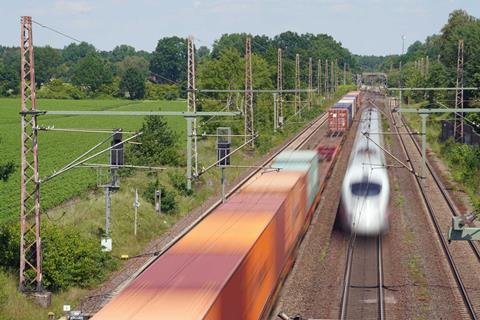
GERMANY: Deutsche Bahn carried more than 1∙8 billion passengers in the year to December 31 2023, up by nearly 6% on the previous year.
Publishing its annual results on March 21, the national railway group reported that its long-distance services had been used by more than 140 million passengers, with DB Fernverkehr recording 45 459 million passenger-km in the year. The Deutschland-Ticket initiative had contributed significantly to a 5∙7% rise in regional and suburban rail traffic with 1 697 million passengers carried, representing 37 485 million passenger-km.
Punctuality of DB’s long-distance passenger services, measured as trains arriving less than 6 min late, was just 64%, with DB Regio achieving 91%; the 2022 figures were 65∙2% and 91∙8% respectively. DB ran 24 325 trains/day in 2023 compared with 23 325 in the previous year.
| Main data for Deutsche Bahn in 2023 and 2022 | ||
|---|---|---|
| 2023 | 2022 | |
| Passengers carried million | 1 837 | 1 737 |
| DB Fernverkehr million | 140∙3 | 132∙0 |
| DB Regio million | 1 697 | 1 605 |
| Passenger-km million | 82 943 | 76 475 |
| Passenger trains operated per day | 24 325 | 23 325 |
| Punctuality % within 5 min 59 sec | 90∙3 | 91∙0 |
| of which long-distance services | 64∙0 | 65∙2 |
| Tonnes carried million | 197∙6 | 222∙3 |
| Tonne-km million | 74 458 | 84 468 |
| Average load per train tonnes | 506∙7 | 499∙4 |
| Staff (excluding DB Schenker) | 219 713 | 209 486 |
| Network length route-km | 33 464 | 33 469 |
| of which electrified | 20 853 | 20 656 |
| Group turnover €m | 45 194 | 52 085 |
| EBIT €m | -1 273 | 1 439 |
| EBIT (adjusted) €m | -964 | 1 225 |
Freight traffic was another story, however, with DB Cargo’s tonnage falling by 11% from the 2022 total of 222∙3 million tonnes to just 197∙6 million. Tonne-km dropped by nearly 12% to 74 458 million, although the average load per train increased from just over 499 tonnes to 506∙7 tonnes. DB Cargo operated an average of 2 267 trains a day, down from 2 632 in 2022. Nevertheless, freight revenue was up by more than 6% at €5∙6bn.
Investment
DB continued to invest heavily in improving its network, with net capital expenditure from its own funds rising by more than 16% to a record €7∙6bn. When funds from the federal government were included, gross capital expenditure in 2023 reached €16∙9bn. This figure is expected to rise to around €21bn in 2024.
Infrastructure costs and ‘substantial upfront expenses of more than €1bn pre-financed for the German government’ had a negative impact on EBIT, with DB Group closing the financial year with an adjusted EBIT of €-964m compared with €1 225bn in 2022. DB expects a positive adjusted EBIT of over €1bn in 2024, with revenue expected to reach €47bn.
Group turnover in 2023 was €45 194m, €19 127m of which was contributed by logistics and road haulage subsidiary DB Schenker, down from €27 604m in 2022. DB expects to complete the sale of Schenker later this year and indicative offers were due to be submitted by March 26 ― over 20 parties have reportedly expressed interest.
Speaking at the publication of the annual results in Berlin, Chairman of DB’s Management Board Dr Richard Lutz described 2023 as a turning point for the business, asserting that, ‘with the German government, we launched the most comprehensive capital expenditure programme since the German Rail Reform in 1994’. Promising that there would be ‘no more running our rail infrastructure into the ground’, Lutz said ‘we made upfront expenditure and carried out more construction than ever before because we cannot delay overhauling and modernising our infrastructure … achieving Germany’s climate and transport policy goals and shifting more traffic to environmentally friendly rail will simply not be possible without high-performance infrastructure.’
DB’s full annual report for 2023 can be found here.

















